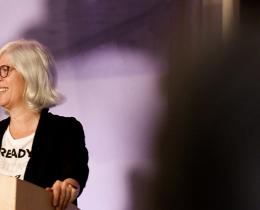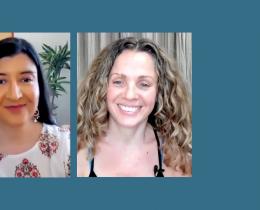Carla: You served as secretary of food and agriculture for California, secretary of agriculture for the United States, and executive director of UNICEF, all very high profile leadership positions. Was it always your career goal to attain leadership positions like these?
Ann: I never imagined myself in those kinds of leadership roles earlier in my career. I took advantage of opportunities that came my way and learned from each experience. After law school, I served as a deputy public defender and then joined a law firm in my hometown in California where we dealt with many issues involving water and agriculture. Then came the opportunity to move to Washington, DC, to work for the USDA. That meant giving up a position as a partner in a law firm, but it started me on a path that led to those leadership positions. After ultimately serving as the secretary of agriculture, I took advantage of another opportunity and moved to New York to take the position with UNICEF. My experiences built upon each other and helped me become a better leader.
Carla: How would you decide which opportunities to follow? What was your criteria?
Ann: That’s a difficult question to answer, but most often it was the opportunity to do something new and different that helped me make my decisions. I am grateful to have been able to do that, as I know many people who have family obligations along with their careers don’t necessarily have the same freedom. But I had the freedom and the opportunity, and I knew that if things didn’t work out I could always return to practicing law. From the outside it might look like my career has jumped around, but to me I think of it as life unfolding as it should. I think you acquire wisdom through experience. And that helps you do the next thing or build alliances around the next issue. Experience is a very important teacher.
Carla: You talk about your government work as “government service.” Is that how you thought of your public positions, as a form of service?
Ann: I grew up in a family that respected the tradition of public service. My father and my grandfather were both public servants, and I saw that kind of work as something worthwhile. These days, fewer people seem drawn to public service because the political atmosphere is so contentious, but I really think of it as service. I love the challenge of discovering common sense public policy solutions to problems. I have a public policy degree and a law degree, and I have spent time in my career in both the private and public worlds. Having such varied experiences—from a law firm to state government to federal government—gave me a greater understanding of how to hopefully affect public policy in a positive way.
Carla: How do you define leadership? What does it mean to you to be a good leader?
Ann: Everyone can be a good leader, even if it’s just in her or his own life. Good leaders are more than just managers. They provide vision that helps people connect the dots. Good leaders gather quality people around them and build well-functioning teams, bringing people together rather than generating disharmony. They use common sense in everything they do, not just doing things a certain way because “that’s the way it’s always been done.” And good leaders ask questions and make informed decisions.
Carla: Were there any defining moments for you as a leader—a time you had to make a hard decision and you knew you were learning something important about leadership in that moment?
Ann: I think I learned more over time rather than in single moments. The most important lessons have been recognizing the importance of collaborative approaches and really listening to others before making a decision. But I have had a few defining moments, or crisis situations, where I had to make a quick judgment call, and those really test you as a leader. One crisis situation occurred when I was Secretary of Agriculture. We called it the Cow Who Stole Christmas. On December 23, 2003, the first case of mad cow disease was found in the United States. We had to put safety measures into effect immediately, and we had to quickly communicate with the public to avoid misinformation and panic. So we pulled together the experts, assessed the situation, and then had a press conference to inform the public, all within about five hours. Many of us on our team had to cancel our Christmas plans to deal with the ongoing crisis.
Carla: In your career, you’ve held positions that few women, if any, have ever held. Do you have any reflections on being a woman in an important position of responsibility?
Ann: While there are certainly exceptions to this observation, among men and women, I find women leaders are generally more collaborative—they usually listen better and tend to be more inclusive. I was the first woman in many of the jobs I had, from being the first woman deputy public defender in Stanislaus County to the first woman secretary of agriculture. But things are changing quickly. When I first became a deputy public defender, people were worried about a woman going into jails and meeting with clients who were incarcerated. Today, more than fifty percent of lawyers are women and we would never question women working with prisoners.
Statistically, women are still underrepresented in leadership positions. I believe that sometimes we need to use affirmative action in making personnel decisions to overcome lack of diversity in the workplace. I would never bring in someone who was less qualified, but I worked hard to bring in women when they were equally qualified candidates, especially in areas where they were underrepresented. I have worked places where I required committees had to have equal representation of women and men, even if that meant putting people at different levels on the same team. This helps build women leaders within an organization.
Carla: What does the role of mentorship play?
Ann: I think it’s important for everyone to have someone to talk with, and I have used various people as sounding boards throughout my life. I have always tried to be a mentor to others about their life or career. In my case, they’re informal relationships, but I think formal mentorship programs are important, too.
Carla: Where is your growth edge right now?
Ann: There are some exciting things happening for me right now. I’m on a number of boards and advisory councils, including some young nonprofits and businesses doing interesting things to create more economic empowerment. I’m working on a public policy initiative on obesity, and an initiative called Feed the Future, which is looking at how to feed our growing world population.
We are living in an interesting time where things are changing at a very rapid rate, driven in large part by technology. I’m an advocate for lifelong learning. As a leader, you must continually learn and work to expand your own knowledge and understanding. It’s important for individuals to invest in their own learning. You can’t survive in today’s world without it. It’s also important for organizations to invest in training and updating their employees. And it’s important to look at the future of our educational system.
Right now we’re teaching kids to be very technologically literate, but are we teaching them to discern what is right and wrong, how to make difficult decisions, or how to connect the dots? We’re moving from a manufacturing society to an entrepreneurial one, and how does that system absorb the large number of young people who are looking for economic opportunities? It comes down to what people are learning. Are we all learning what we need to in order to contribute to today’s economy?
Carla: In our society, we place a high value on finding work you love, but how can people relate to their work in a meaningful way even if it’s not their ideal job?
Ann: People everywhere need an opportunity to make a living. While sometimes it may not be what you want to be doing (which is especially true for many young people right now), it doesn’t mean you can’t participate in whatever you are doing in a way that is meaningful. I’ve met many people who are so dissatisfied they are not effective in the workplace. But I’ve also noticed that many of them are dissatisfied with their life, in general. If you find yourself unhappy with your family, your community, or your life, then work often gets the blame. It is important to keep a positive attitude in whatever you are doing.
Carla: Nicholas Kristoff and Sheryl WuDunn, in their book Half the Sky, say that the moral issue facing society in the 19th century was slavery, in the 20th century it was totalitarianism, and in the 21st century it will be the abuse and oppression of women and girls. Do you agree this is the moral issue of the day?
Ann: This is an important moral issue. While not losing sight of how far we’ve come in our own country—Gail Collins’ book is a good chronicle of where we’ve come so far [When Everything Changed: The Amazing Journey of American Women from 1960 to the Present]—I have a growing concern about at-risk youth, particularly girls, who are being kidnapped and trafficked or being held as slaves or prostitutes. I also think we need to continue to talk about how media exploits women and girls and how that is contributing to a whole host of social issues. Half the Sky addresses the importance of empowering women in order to change societies.
Carla: Do you think economic development is an effective way to address violence against women and girls?
Ann: I think a lot of the change we desire from a human rights perspective can’t be forced. Whether it’s ending early marriage for girls, lack of women’s legal rights, inability to own property, the absence of mechanisms for reporting violence or abuse, or things like honor killings or female genital cutting, true cultural change around these issues needs to come from within a society. Much of the foreign assistance and development work has historically been to simply provide aid. If we truly mean to produce cultural change, we need human rights education, and we need to empower the local economy, starting with women. If you teach people about the harmful effects of some of these practices, and show them that when women and girls are educated and have health care the family’s income will likely go up, we can begin to address the enormous poverty issue.
Carla: If you are a leader of an organization or a government entity, is there something you should be doing right now to empower women and girls?
Ann: First, we need to recognize the issues. Then we need to share the evidence. People need to know what’s going on and that economic empowerment for women is not just for women’s sake but for society as a whole. Social media is helping us change how we get and share information, and so is television. As cultures that previously didn’t have technology get it, there are opportunities for education, ironically, in the media. For example, writing the stories of soap operas in such a way that shows women an alternative and creates a discussion has been an effective tool in some developing countries.
Also, leaders need to be sure they’re not looking through the same old lens, which was typically a man’s lens, when thinking of these issues. It’s important to have a diversity of thinking, which one gets from having diversity among employees, diversity on the board of directors, and diversity in your leadership if you’re going to address these issues through new and different lenses. For example, we focus a lot today on climate change, and the fields that work on those issues tend to be male dominated. Are they thinking about the fact that 70% of small farmers, particularly in the poorest countries, are women? If there is a drought, these women need spend even more time carrying water and may pull their daughters out of school to help. We need to start seeing the interconnectedness of all these issues. It’s complex, and there’s not one solution, but we all share a common goal of creating a better world.



